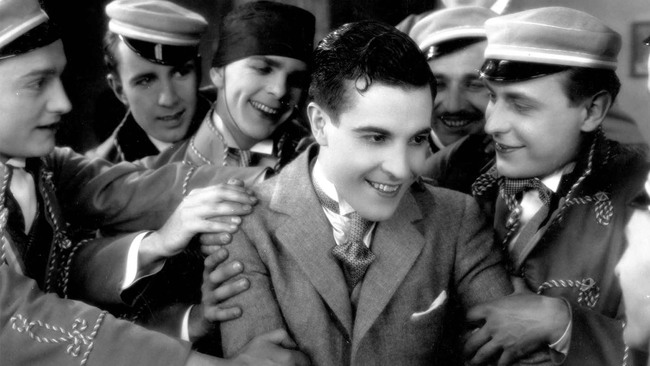Goings On: Venice, Pordenone, and More

The Venice International Film Festival, whose seventy-fourth edition runs from August 30 through September 9, has not only revamped its site, it’s also added three films to its lineup.
- John Woo’s Manhunt will premiere Out of Competition. “A contemporary remake of a Japanese classic of the genre, it’s the story of a Chinese man who is framed for murder in Japan; he tries to clear his name as he dodges a manhunt organized by the Japanese police and the attacks of mysterious killers.”
- Andrea Segre’s L’ordine delle cose, a Special Screening, “tells the story of Corrado, a policeman who is a member of a task force running the system which controls the flow of immigrants. Corrado is sent to coordinate a delicate mission in Libya, where he meets Swada, a young Somali woman who is trying to rejoin her husband in Finland.”
- Marco di Castri, Paolo Favaro, and Daniele Pianciola’s L’Énigme de Jean Rouch à Turin will compete in the Venice Classics Documentaries section. It reconstructs the two years Rouch spent in Turin, 1984 to 1986, making Enigma.
Le Giornate del Cinema Muto, also known as the Pordenone Silent Film Festival, has relaunched its site as well. Looking good. And the full program for the thirty-sixth edition, opening on September 30 with King Vigor’s The Crowd (1928) and closing on October 7 with Ernst Lubitsch’s The Student Prince in Old Heidelberg (1927; image above), is up, too.
The Film Society of Lincoln Center is taking applications to the 2017 New York Film Festival Critics Academy. The workshop takes place during the festival running from September 28 through October 15.
Photogénie and Film Fest Gent (October 10 through 20) are staging their fourth Young Critics Workshop, led by Nick Pinkerton from October 12 through the end of the festival. It’s open to aspiring film critics aged eighteen to twenty-six.
More Goings On
New York.Ed Halter for 4Columns: “Maverick director Alan Clarke has long been admired in Britain for controversial dramas that focus a grimy social-realist lens on some of his nation’s most marginalized inhabitants, his most explosive efforts looking into tightly knit all-male micro-societies that skew criminal and working-class. But Clarke—whose sprawling filmography includes over sixty productions—is only beginning to achieve the same level of renown on our shores. Anthology Film Archives’ sixteen-film retrospective may help redress this oversight—and thanks to a quirk of international exhibition rights, all but two of the screenings will be offered free to the public.” The Elephant in the Room: The Films of Alan Clarke is on through August 20.
Tomorrow, Light Industry presents Thomas Harlan's Torre Bela (1975). Serge Daney once wrote that it “shows—materialized, embodied—all the key ideas of political and theoretical leftism from the past decade. ‘As if we were there’—but precisely, we are no longer there: no one is.”
With 4 Days in France playing at the Quad through Thursday, Vadim Rizov talks with director Jérôme Reybaud for Filmmaker.
Los Angeles. On Wednesday, Rob King, author of Hokum! The Early Sound Slapstick Short and Depression-Era Mass Culture, will introduce Irving Cummings’s Hollywood Cavalcade (1939) and a collection of shorts at the Billy Wilder Theater.
George Miller’s Babe: Pig in the City (1998) screens at the New Beverly tonight. “It’s genuine, not corny,” writes Kim Morgan. “Sincere. Being this sincere isn’t as easy as it looks.”
Chicago. Mario Bava’s Black Sabbath (1963) and Lisa and the Devil (1973), Alexander Dovzhenko’s Earth (1930), and William Beaudine’s The Old Fashioned Way (1934) are just a few of the highlights on this week’s Cine-List.
Berkeley.Full: Spaces is an evening of sound performances by Amma Ateria and Kevin Corcoran and, from Paul Clipson, multiple 16 mm projections. Tonight at BAMPFA.
Boston. With Twin Peaks: Fire Walk with Me (1992), David Lynch “returns to the cinema from television,” writes Christian Gay, “and seems to tip his hat to the master of movie suspense and another television pioneer, Alfred Hitchcock.” Wednesday at the Brattle.
London. The BFI season Jean-Pierre Melville: Visions of the Underworld opens tomorrow and runs through September. “He was a commercial filmmaker without much commercial intent,” writes Christina Newland, “and a lover of the American cinema who was as abstractly European as they come. He was a friend and influence to the French New Wave filmmakers, before later becoming their sworn enemy. Yet, in spite of all that contradiction, his films have a minimalism and purity that give them a genuine auteurist sweep.” Also writing for the BFI, Andrew Male takes on the question, “What makes a French film noir?”
For news and items of interest throughout the day, every day, follow @CriterionDaily.



